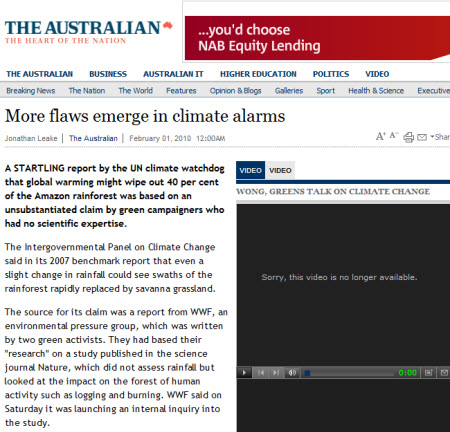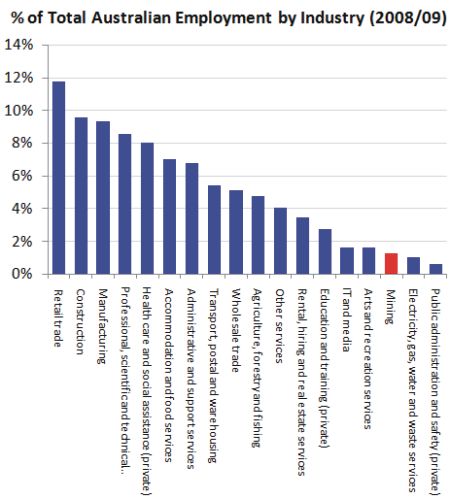How The Alliance
of Coal, Oil, Government, Media
and Google are Feeding You ‘Manure’ And Keeping you
in the Dark |
|
The first of three examples,
how The Australian "newspaper" doesn't let facts get
in the way of what they want you to believe. You should ask yourself,
who benefits from putting off dealing with carbon emmissions??
Who has the money to buy off editorial content?? |
|
The Australian is due for an embarrassing retraction
over a front-page story attacking the Intergovernmental
Panel on Climate Change and the World Wildlife Fund for an “unsubstantiated”
claim that 40% of the Amazon rainforest would be wiped out by
global warming. But will they put it on the front page where
the misinformation occurred????
The story, by Sunday Times journalist Jonathan Leake, was exposed
as a sham in a retraction published in The Australian's sister
paper and brokered by the UK Press Complaints Commission. The
complaint, lodged by Royal Society scientist Dr Simon Lewis,
claimed The Times published “inaccurate, misleading or distorted
information” and the complaints commission agreed.
On February 1 this year, one day after the Sunday Times ran
the story, The Australian put it on the front page. The story
said that the claims of Amazon destruction were based on the
views of “green campaigners who had no scientific expertise”.
The “scandal”, dubbed “Amazongate”, was repeated
across the media, including ABC's Radio National (The World
Today), 2GB's Alan Jones and The Sydney Morning Herald.
Part of the Sunday Times apology reads:“In fact, the IPCC's
Amazon statement is supported by peer-reviewed scientific evidence.
In the case of the WWF report, the figure had, in error, not
been referenced, but was based on research by the respected Amazon
Environmental Research Institute (IPAM) which did relate to the
impact of climate change.”
The papers infuriated Dr. Lewis by falsely
quoting him. Lewis approached the media regulator demanding
an apology from the paper, and the story's removal from The Sunday
Times website. “We accept that Dr Lewis holds no such view
rather, he was concerned that the use of non-peer-reviewed sources
risks creating the perception of bias and unnecessary controversy,
which is unhelpful in advancing the public's understanding of
the science of climate change. A version of our article that
had been checked with Dr Lewis underwent significant late editing
and so did not give a fair or accurate account of his views on
these points. We apologise for this.”
“Amazongate” came right after
the notorious “Climategate” fracas, covered extensively
in The Australian, that exposed leaked emails sent by climate
scientists from the University of East Anglia. Those emails have
been the subject of several investigations now and the consensus
is there was nothing unprofessional in their content.
News Limited columnists, including Andrew Bolt, revelled in these
controversial stories. In a blog post titled “Now the IPCC
sexed up the Amazonian danger, too”, Bolt accused the panel
of publishing “wild scare-claims, many based on unchecked
statements by activist groups”.
Besides the fact this national news paper
was wrong in a way suggesting an editorial bias, their influence
was spread across the media spectrum in Australia. Even to the
ABC. Numerous blogs and websites picked up the item and spread
it in a way that makes the story appear beyond repute, but it
wasn’t. |
 |
 |
|
How the big
coal companies and media dimissed a government that threatened
to stop them from playing Australia for mugs. 100% bullshit scare
campaign |
|
For International Readers; The Australian
Prime Minister was recently deposed in a party coup, largely
because of the perception that a new tax he had proposed on the
excessive profits of the mining industry would cause loss of
jobs and overall weakening of the national economy. Whilst the
former PM was responsible for a shopping list of bad legislation
and irresponsible government, this is the one thing he may have
had right but... he didn’t have media on side.. big mistake
and the facts were the first casualty of that war, his political
career the second. |
From a report at www.crikey.com.au;
“In 2008/09, the Australian mining industry had a EBITDA/Revenue
ratio of 43% while the worlds largest 40 mining companies had
a comparable estimate of 30%
When mining companies in Australia say that their investment
in mining will cease domestically as a result of the Resource
Super Profits Tax (RSPT), they are effectively stating that their
firm will not exploit these immobile, finite resources which
make up to nearly 40% of the total global supply of these minerals.
Should we care if companies like Fortescue, Xstrata or Clive
Palmer's operations pull the plug or cease investment?
With profit margins that high in Australia compared to the profit
margins that other domestic industries in Australia receive,
and with EBITDA/Revenue ratios much higher in Australia compared
to what the largest global miners are receiving around the world
(especially considering that a part of these global earnings
ratios are slightly boosted by Australian operations), even
under a worse case RSPT scenario where mining profits in Australia
take a significant haircut ( a dubious argument at best considering
the design of the tax), for every noisy mining interest in Australia
that walks away, there will, literally, be an army of mining
investment and general investment lining up to take their place.
Our profits and our resources are simply too good an opportunity
to pass up even if the profit margins involved in Australia
are seriously reduced. When the noisy miners say that their capital
is mobile, they are dead right their capital is indeed mobile,
but in exactly the same way that every other mining firm's capital
is mobile, including the capital of the worlds largest 40 miners.
With industry profits in Australia so high compared to both other
domestic industries and the largest 40 global miners, with Australia
owning a substantial piece of the worlds immobile and finite
accessible mineral resources, Big Dirt walking away from Australian
investment will be their loss, not ours because someone else
will simply take their place.
Big Dirt welcome to capitalism.”
The mining interests were successful
in creating enough public support in spite of the facts and the
PM’s career was done.
|
 |
 |
 |
And finally....
Did The Australian Government,
With Paid Cooperation
From Google Suppress News Of Australian
Customs To Help Snare More Innocent Yachties?? |
|
In February of 2007, The Coastal
Passage was preparing another article on Australian Customs service.
As a normal part of fair coverage, Customs website was regularly
looked up. During that period, A Google search of “Australian
Customs” turned up a first page that listed three web pages
from the TCP web site that were disparaging of customs....
It was remembered at the time that this
must have been very annoying for the customs people. It was
apparent that the pages from The Coastal Passage were probably
getting more activity than Custom’s own site. This may
have been the case in that the TCP website was more informative
at that time. The Customs website then had contradictory and
inaccurate information.
Then one day in March the pages from The
Coastal Passage disappeared off Google. Not back a couple pages
but the articles that had been first page vanished. Other search
engines like Lycos, MS Live Search, and others retained TCP position
for some time but with Google not referring, the pages eventually
slipped on all search engines.
At that time, TCP sent fax’s to Google
in California and Sydney asking for Google’s comment on
this but received no denial.
It was finally revealed in a parliamentary
debate in June that indeed, the Australian government has been
spending “millions” on Google to direct searches. TCP
would suggest that those funds could have been involved in the
above situation. This would amount to the government using taxpayer
monies to interfere with freedom of the press. |
|
From Wikipedia
early 2007 |
 |
|